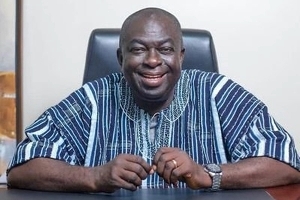- Home - Entertainment
- Lifestyle News
- Entertainment Videos | TV
- Year In Review
- Music News
- Entertainers
- Entertainment Archive
- Entertainment Photos
- Jokes
- Entertainment Headlines
- Ameyaw Debrah
- Brown GH
- Celebrities Buzz
- GH Base
- Ghana Celebrities
- Gh Gossip
- GH Page
- GH Splash
- Hot Gossip GH
- YEN

Music of Tuesday, 19 April 2005
Source: ghanamusic.com
Expert Criticises Copyright Bill
An International Folklore Expert has criticised clauses in the new Copyright Bill before Cabinet that made it mandatory for Ghanaians to pay royalty for the commercial use of folklore.
Speaking on the condition of anonymity to the Ghana News Agency, in Accra, the Expert described the Bill as totalitarian and also contravened conventions on human rights.
He mentioned specifically the clause that imposed a fine, jail or both on any Ghanaians who commercially use, sell or distribute Ghanaian folklore or translations without Government's permit.
The Senior Lecturer at the University of Ghana said the Bill would create a terrible situation for the future well being of the country's culture, which required a constant dynamic recycling to stay alive in the Global Village.
He said in the modern world, cultural recycling also included commercial recycling.
The International Folklore Expert identified six specific problems the proposed Copy Rights Bill would create with particular emphasis on the folklore royalty tax.
It includes: the stunting of interpersonal, oral and informal cultural creativity; generational cultural adoption, which he said would alienate the youth from their indigenous roots. He observed that if Ghanaians are taxed out of their own culture they would be ever more inundated by free Western culture.
He questioned how the implementers of the Bill would be able to differentiate between Ghanaian folklore and that of neighbouring African countries? "Who exactly owns the Agbadza and Gahu traditional drum-dances of Ghana, Togo and Benin, or the kente cloth of Ghana and La Cote d' Ivoire?"
He said the Bill would also create a conflict between the Government and custodians of culture and tradition, explaining that it would be difficult to establish the one who owns for instance the Adinkra symbol. Is it Asantes or the state?
"By putting brakes on Ghanaian folkloric development these clauses may enhance the influx of free western cultural and folkloric norms, and other components of Western 'cultural imperialism' that are already flooding into Ghana," he said.
The expert said African folkloric music and dance form an important component of the lucrative international 'World Music,' market that currently generates 1.5 billion dollars a year.
The Bill he said would interfere with the growth of folkloric music as a potential non-traditional export and have a negative impact on the Ghanaian tourist industry. The International Folklore Expert said the World Intellectual Property Organisation (WIPO) recommended in the 1980's that, in the light of the extreme economic imbalance in the world, developing nations should nationalize their folklore in respect to its commercial exploitation by Industrial 'First World' nations. "Folklore from any country had been considered a common heritage for anyone to use freely," he explained.
In short WIPO recognized that the world is not an equal playing-field and made recommendations to protect and compensate developing nations whose folklore was being commercially exploited by companies in the industrial nations.
However, WIPO in its 1989 report on the 'Protection of Expression of Folklore' made it quite clear (pages 10,11) that this protection/taxation of the folklore of developing nations should only apply 'outside the country or origin'. It was never meant to be applied internally. He said Ghana was among the pioneers to carry out legislation in line with the WIPO.
Provisions have been made in the Bill for the collection of foreign folkloric royalties. He said the establishment of the National Folklore Board of Trustees was to take an inventory of all Ghanaian folklore and monitor its commercial use abroad.










